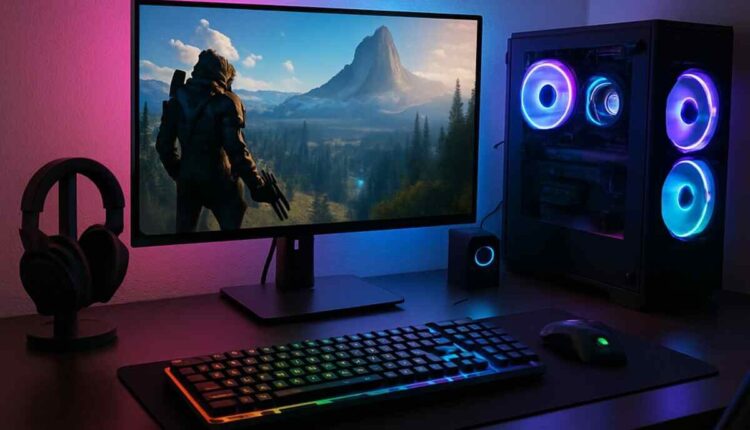How to Determine If You Can Play This Game
When it comes to diving into the world of gaming, one of the first questions that might pop into your mind is, “Can I play this game?” Whether you’re a casual gamer or someone looking to explore new digital adventures, figuring out if a game is right for you can sometimes feel like navigating through a maze. But fear not! We’re here to break it down for you in simple, easy-to-follow steps. To know more, check out gushansentv.com
Before you hit that “buy” or “download” button, it’s crucial to know if your current setup can handle the game you’re eyeing. Game requirements are like a checklist that tells you what your system needs to run a particular game smoothly. Understanding these requirements is the first step toward ensuring you have a seamless gaming experience.
Know Your Device Specifications
First things first, you need to know what you’re working with. Whether you’re using a PC, console, or mobile device, understanding the specifications of your device is key. Here’s a comprehensive guide on how to find this information:
- For PC Users: Check your system’s specifications by right-clicking on ‘My Computer’ or ‘This PC’, selecting ‘Properties’, and noting down your processor type, RAM, and graphics card details. You can also use software like CPU-Z or Speccy for a more detailed breakdown of your system specs. Understanding your storage capacity and available space is also essential, as games can be quite large in size.
- For Console Users: Usually, consoles like PlayStation, Xbox, or Nintendo Switch have standardized specifications, so you just need to ensure the game is compatible with your console model. However, be aware of the storage capacity and any required updates for the console’s operating system which might impact your gaming experience.
- For Mobile Users: Go to settings and find ‘About Phone’ or ‘About Tablet’ to view your device’s specifications. Additionally, check the operating system version, as some games require the latest updates to function correctly. Battery capacity and efficiency can also affect your gaming sessions, especially for intensive games.
Understand Game Platform Requirements
Once you know your device specs, the next step is to compare them with the game’s requirements. Most games will list out minimum and recommended specifications. Here’s what you should look for:
- Minimum Requirements: These are the bare minimum specs your device needs to run the game. Playing at this level might mean lower graphics settings and potentially more lag. It’s important to note that meeting only the minimum requirements might limit your access to certain game features or updates.
- Recommended Requirements: If your device meets or exceeds these, you’re in for a smoother, more visually appealing gaming experience. This often allows you to play the game with higher graphical settings, which can enhance immersion and enjoyment. Additionally, recommended specs can ensure better support for future game updates.
- Optimal Settings: Some games provide optimal settings for different types of hardware. Understanding these settings can help you tweak your device for the best balance between performance and visual quality. This can be particularly useful for high-performance games that demand more from your device.
Checking Compatibility
Now that you have all the necessary information, it’s time to do a little comparison. Check the game’s official website or the platform from which you’re purchasing (like Steam, Epic Games, or the App Store) to find the requirements. Match these with your device specifications to see if you’re good to go.
- Platform-Specific Features: Some games offer unique features on different platforms. Make sure to check if there are any platform-specific optimizations or limitations that could affect gameplay.
- Cross-Platform Play: If you’re interested in playing with friends who use different systems, verify if the game supports cross-platform play. This feature can greatly enhance your multiplayer experience.
- Future-Proofing: Consider whether your current setup can handle upcoming game updates or expansions. Developers often release patches that may increase the game’s system requirements, so it’s wise to have some wiggle room in your device’s capabilities.
The Role of Internet Connection

In today’s digital age, many games require an internet connection, either for downloading, playing online, or accessing additional content. A stable internet connection is crucial for a seamless gaming experience, especially for online multiplayer games.
Internet Speed
A fast and stable internet connection can significantly impact your gaming experience, especially for online multiplayer games. Use online tools like Speedtest.net to check your internet speed and ensure it meets the game’s requirements. Look for:
- Download Speed: Needed for downloading the game and updates. A higher download speed ensures that you can quickly access new content, patches, or expansions without long waiting times.
- Upload Speed: Important for online gaming and streaming. A good upload speed is crucial for sending data to game servers and can affect your ability to host games or stream content to platforms like Twitch.
- Ping Rate: Lower ping rates mean less lag during gameplay. A lower ping is essential for competitive gaming, as it ensures quicker response times and smoother interactions with other players.
Data Caps and Usage
If you have a limited data plan, keep an eye on how much data gaming consumes. Some games, especially those with high-resolution graphics or live-streaming features, can eat up data quickly.
- Monitoring Data Usage: Use tools or apps provided by your internet service provider to track your data consumption. This can help you avoid unexpected overage charges.
- Adjusting Game Settings: Some games allow you to adjust settings to reduce data usage, such as lowering graphics quality or disabling automatic updates.
- Offline Gaming Options: Consider games with offline modes or single-player campaigns that don’t require a constant internet connection. This can save data and still provide an enjoyable gaming experience.
Evaluating Gameplay and Genre
Now that the technical stuff is out of the way, let’s talk about the game itself. Not every game will be your cup of tea, so it’s important to consider if the game suits your interests and playstyle. Understanding different game genres and mechanics can help you make an informed decision.
Explore Different Genres
Games come in all shapes and sizes, from action-packed shooters to serene puzzle games. Here are a few popular genres to consider:
- Action/Adventure: Fast-paced and often involve combat. These games are perfect for those who enjoy quick reflexes and thrilling gameplay. They often feature engaging storylines and open-world exploration.
- Role-Playing Games (RPGs): Focus on character development and story. RPGs allow you to immerse yourself in rich narratives and build complex characters. They often include elements like skill trees and branching story paths.
- Simulation: Mimic real-world activities (think The Sims). Simulation games offer a wide range of experiences, from managing a city to flying an airplane. They can be educational and provide a sense of achievement through strategic planning.
- Strategy: Require careful planning and decision-making. These games challenge your tactical skills and often involve managing resources and leading armies or civilizations. Strategy games can be turn-based or real-time, catering to different playstyles.
- Puzzle: Focus on solving challenges through logic and pattern recognition. Puzzle games offer a relaxing yet stimulating experience and can vary from simple brain teasers to complex problem-solving adventures.
Read Reviews and Watch Gameplays
Before committing to a game, check out reviews from other players. Platforms like Metacritic, Steam, and YouTube can provide valuable insights into what to expect. Watching gameplay videos can also give you a feel for the game’s mechanics and storyline.
- Player Feedback: Reviews often highlight the strengths and weaknesses of a game, such as graphics, story, and gameplay mechanics. Look for common themes in player feedback to get a clearer picture of the game’s quality.
- Professional Reviews: Consider reading reviews from reputable gaming websites or magazines. Professional reviewers often provide in-depth analysis and comparisons to similar titles.
- Gameplay Videos: Watching gameplay videos can help you understand the pacing, visual style, and overall vibe of the game. This firsthand look can be crucial in deciding whether the game aligns with your interests.
Trying Before Buying
Many platforms offer demos or free trials, allowing you to test the waters before diving in. This is a great way to see if you enjoy the game and if it runs well on your device without any financial commitment.
Free-to-Play Options
Consider exploring free-to-play games which often offer a substantial amount of content without requiring a purchase. They can be a good way to get a taste of a new genre or game style.
- In-Game Purchases: Be aware that free-to-play games often include microtransactions. These can enhance your experience but are not always necessary for enjoying the game.
- Limited-Time Events: Many free-to-play games host special events that offer unique rewards or content. Participating in these events can provide a fresh experience and keep the game exciting.
- Community Engagement: Free-to-play games often have active communities that can enhance your gaming experience. Engaging with other players can provide tips, support, and a sense of camaraderie.
Community and Support
Lastly, don’t underestimate the power of community. Many games have thriving online communities where you can seek advice, tips, and support. Whether it’s through forums, social media groups, or in-game chat, connecting with other players can enhance your gaming experience.
- Online Forums: Platforms like Reddit, Discord, and official game forums are excellent places to connect with other players. You can find discussions, guides, and updates about the game.
- Social Media Groups: Joining groups on Facebook or following game-related hashtags on Twitter can keep you informed about news, fan content, and community events.
- In-Game Communities: Many games offer guilds, clans, or other in-game communities. Joining these groups can provide a sense of belonging and open up opportunities for cooperative play.
Conclusion
Determining if you can play a game isn’t just about meeting technical requirements; it’s also about ensuring the game aligns with your interests and playstyle. By understanding your device’s capabilities, checking internet requirements, exploring game genres, and engaging with the community, you’ll be well on your way to making informed gaming choices.
Remember, the world of gaming is vast and full of opportunities to explore new stories and experiences. So go on, find the game that’s right for you, and enjoy your adventure! With the right preparation and exploration, you’re bound to find a game that provides not just entertainment but also a rewarding and enriching experience.


